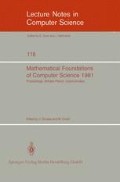Abstract
The paper gives a survey on oracle approaches in nonlinear and combinatorial optimization. We present a formal definition of oracle algorithms in terms of mappings rather than in the framework of Turing machines with query tapes. We discuss the application of oracle techniques in fixed point theory and convex optimization. Using oracle arguments we derive lower bounds on the computational complexity in combinatorial optimization. Finally we examine formally equivalent concepts in contrast to their computational strength.
Preview
Unable to display preview. Download preview PDF.
References
Baker, Th., Gill, J., and Solovay, R.; Relativizations of the P = ? NP question. SIAM Journal on Computing 4 (1975) 431–442.
Chvátal, V.; Hard knapsack problems. Operations Research 28 (1980) 1402–1411.
Cook, S.A.; The Complexity of theorem — proving procedures. Proc. of the 3rd Annual ACM Symposium on the Theory of Computing, Shaker Heights, Ohio (1971) 151–158.
Dobkin, D. and Lipton, R.J.; A lower bound of 1/2 n2 on linear search programs for the knapsack problem. In: A. Masurkiewicz (ed.), Mathematical Foundations of Computer Science (1976), Lect. Notes in Corp. Science 45.
Grötschel, M., Lovász, L., and Schrijver, A.; The ellipsoid method and its consequences in combinatorial optimization. To appear in: Combinatorica.
Hausmann, D., Kannan, R. and Korte, B.; Exponential lower bounds on a class of knapsack algorithms. To appear in: Mathematics of Operations Research.
Hausmann, D. and Korte, B.; Oracle algorithms for fixed — point problems — an axiomatic approach. In: Henn et al. (eds.), Optimization and Operations Research, Lecture Notes in Economics and Mathematical Systems 157 (1978) 161–172.
Hausmann, D. and Korte, B.; Lower bounds on the worst — case complexity of some oracle algorithms. Discrete Mathematics 24 (1978) 261–276.
Hausmann, D. and Korte, B.; Algorithmic versus axiomatic definitions of matroids. Mathematical Programming Study 14 (1981) 98–111.
Hausmann, D. and Korte, B.; The relative strength of oracles for independence systems. In: J. Frehse, D. Pallaschke, U. Trottenberg (eds.), Special topics of applied mathematics, North Holland, 1980, 195–211.
Jensen, P. M. and Korte, B.; Complexity of matroid property algorithms. To appear in: SIAM Journal on Computing.
Judin, D. B. and Nemirovskii, A. S.; Evaluation of the informational complexity of mathematical programming problems. Ekonomikai Matematicheskie Metody 12 (1976) 128–142. Matekon 13,2 (1977) 3–25.
Korte, B. and Hausmann, D.; An analysis of the greedy heuristic for independence systems. In: B. Alspach, P. Hell, and D. J. Miller (eds.), Annals of Discrete Mathematcis 2 (1978) 65–74.
Korte, B. and Monma, C. L.; Some remarks on a classification of oracle-type-algorithms. In: Collatz et al. (eds.), Numerische Methoden bei graphentheoretischen und kombinatorischen Problemen, Band 2 (1979) 195–215.
Korte, B. and Schrader, R.; On the existence of fast approximation schemes. To appear in: O. L. Mangasarian, R. R. Meyer, S. M. Robinson (eds.), Nonlinear Programming 4.
Labetoulle, I., Lawler, E. L., Lenstra, J. K., and Rinnooy Kan, A. H. G.; Preemptive scheduling of uniform machines subject to release dates. Mathematisch Centrum, Preprint BW 99/79 (1979).
Milner, E. C. and Welsh, D. J. A.; On the computational complexity of graph theoretical properties. In: Nash-Williams (ed.), Proceedings of the 5th British combinatorial conference, Aberdeen 1975.
Nemhauser, G. L. and Wolsey, L. A.; Best algorithms for approximating the maximum of a submodular set function. Mathematics of Operations Research 3 (1978) 177–188.
Orevkov, V. P.; A constructive mapping of a spuare onto itself displacing every constructive point. Soviet Mathematics IV (1963) 4–6.
Robinson, G. C. and Welsh, D. J. A.; The computational complexity of matroid properties. Mathematical Proceedings of the Cambridge Philosophical Society 87 (1980) 29–45.
Sahni, S.; Preemptive scheduling with Due dates. Operations Research 27 (1979) 925–934.
Seymour, P. D.; Recognizing graphic matroids. Working Paper, Merton College, Oxford and University of Waterloo, Canada (1979).
Welsh, D. J. A.; Matroid theory. Academic Press, London-New York-San Francisco (1976).
Yao, A. C., Avis, D. M., and Rivest, R. L.; O(n2 log n) lower bound to the shortest paths problem. In: Proceedings of the Ninth Annual ACM Symposium on the Theory of Computing, 11–17 (1977).
Author information
Authors and Affiliations
Editor information
Rights and permissions
Copyright information
© 1981 Springer-Verlag Berlin Heidelberg
About this paper
Cite this paper
Korte, B., Schrader, R. (1981). A survey on oracle techniques. In: Gruska, J., Chytil, M. (eds) Mathematical Foundations of Computer Science 1981. MFCS 1981. Lecture Notes in Computer Science, vol 118. Springer, Berlin, Heidelberg. https://doi.org/10.1007/3-540-10856-4_74
Download citation
DOI: https://doi.org/10.1007/3-540-10856-4_74
Published:
Publisher Name: Springer, Berlin, Heidelberg
Print ISBN: 978-3-540-10856-6
Online ISBN: 978-3-540-38769-5
eBook Packages: Springer Book Archive

